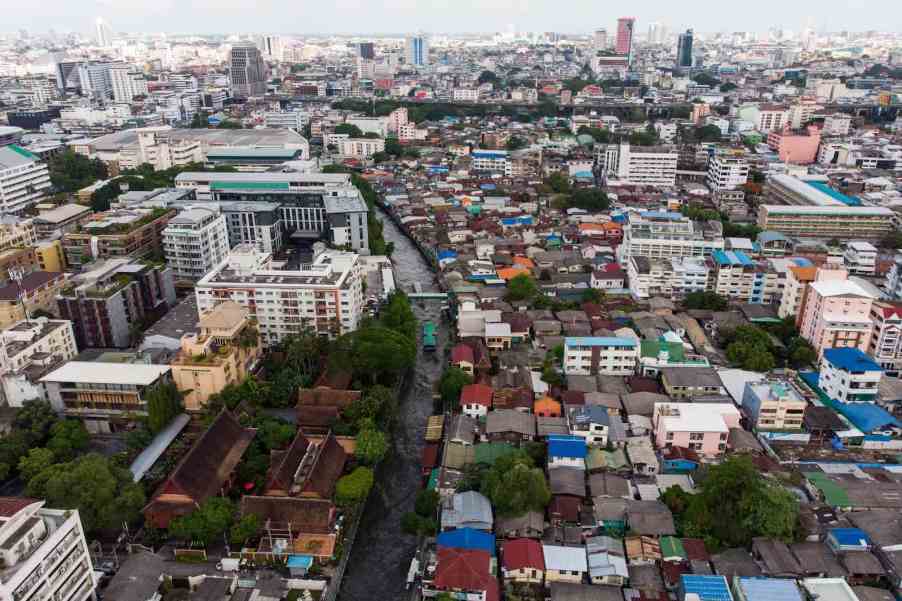
A Buddhist monk and a ‘hippo’ team up to clean Bangkok’s canals
A monk and a hippo walk into a river. It sounds like an off-color joke’s setup. But in Bangkok, Thailand it is no joke. The abbot of Wat Chak Daeng temple is partnering with a solar powered automated barge, called the “Hippo,” to clean the city’s canals.
I finally visited Bangkok for the first time last year. I was blown away by the range of architecture and cultures on display from one neighborhood to the next. Bangkok’s built along a canal system in the delta of Thailand’s largest river: the Chao Praya. Picture a Venice or Amsterdam in tropical Southeast Asia. With eight billion residents.
Bangkok has world-class amenities such as hotels and hospitals and a teeming financial district–with a thriving millionaire class. It also has millions of residents recently emigrated from Thailand’s rural farmland or islands. Many build camps along the canals and open up shops, some even make a living by fishing. I’ll never forget the sight of a business man in a suit walking down to the crowded canal on his lunch break to buy fried fish wrapped in newspapers.
Monsoon rains come often and can sweep entire camps into the river. And along with them, tons of trash. Folks who can’t afford landfill fees also toss trash into the canals–despite fines as high as an entire month of the average Thai’s salary. The Chao Praya carries 4,000 tonnes of plastic into the Gulf of Thailand each year. Flying into Suvarnabhumi International, you can see the river’s brown from Bangok all the way to the sea.

I wish I’d visited the Phra Mahapranom Dhammalangkaro Buddhist templed during my trip. Its current abbot is a monk named Wat Chak Daeng. He says as a novice monk in the 1980s, he remembers children playing in the Chao Praya, even drinking it by the handful. But when he returned to Phra Mahapranom Dhammalangkaro, he found it surrounded by dirty water and trash-littered ground.
He built a recycling center on the templed grounds. He reached out to the local community, urging them to do a good deed and bring their plastic in for recycling. “People can make [Buddhist] merits by giving us plastic bottles, bags and paper.” You could think of merits as points you collect during this life, which will dictate your next one. And they turned out to be a better incentive than the fines.
A project that started as a handful of bottles has blossomed into a center recycling 300 tonnes of plastic annually. They recycle what they can traditionally. But some types of plastic can’t be recycles. So they’ve figured out how to isolate the plastic strands and transform the waste it into the signature orange robes Buddhist monks wear. They also use a process called pyrolysis to break stubborn multi-layered plastic down into oil used in fertilizer for industrial compost operations.

Daeng’s operation is so efficient, he can recycle all the plastic that residents bring him, and is ready for more. So he’s partnered with the Seven Clean Seas nonprofit which builds solar-powered rubbish collection barges. The barge, named and branded as the “hippo,” floats through the canals and scoops up debris. A crew steers it, but a solar-powered automated conveyer belt packs the debris into a dumpster. When its full, it sets sail for Dhammalangkaro. There, the monks sort through the debris to pick plastic and other recyclables apart from anything biodegradable.
Companies in Bangkok can buy plastic credits to offset their plastic footprint, and these will go to maintaining the Hippo or even expanding the fleet. But authorities hope the sight of the strange, automated creature will serve another purpose. Chalatip Junchompoo, a director of the Marine and Coastal Resources Research Centre said, “When people see the Hippo, it will make them curious. They will want to know what it is and why it’s there.” Hopefully it will make them think twice about tossing plastic into the canal when they could bring it to Abbot Daeng instead.



